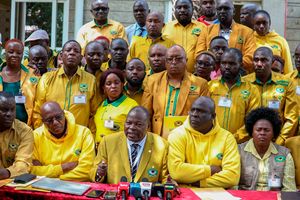
Kenya Union of Post Primary Education Teachers Secretary General Akello Misori (centre) and other Kuppet officials address the media in Nairobi on September 20, 2024.
A group of teachers has formally objected to proposed amendments to the constitution of the Kenya Union of Post-Primary Education Teachers (Kuppet), citing concerns over lack of transparency and unfair changes that could limit democratic participation in union affairs.
The members, led by Vivian Chepkemoi Towett, have submitted a petition to the Registrar of Trade Unions, arguing that the amendments, as outlined in Kenya Gazette Notice No. 1403 dated February 6, 2025, were introduced without proper consultation.
Among the proposed changes is the adjustment of the union’s motto from "Integrity" to "Solidarity," a move that critics argue alters the union’s core principles. Additionally, the amendments introduce a significant increase in nomination fees for leadership positions, expansion of the National Executive Board (NEB), and establishment of new regional councils.
According to the objecting members, the changes will create unnecessary bureaucratic hurdles and raise the cost of vying for leadership, thereby disadvantaging grassroots candidates. They also claim that Kuppet violated Article 25 of its own constitution, which requires amendments to be circulated to branches for discussion before being formally adopted.

Kenya Union of Post Primary Education Teachers Secretary officials address the media in Nairobi on August 25, 2024.
"These changes were rushed through without proper member engagement. The sharp increase in nomination fees locks out many qualified candidates from contesting leadership positions," said Ms Towett.
The introduction of regional councils has also raised concerns, with members arguing that it could cause power struggles between the national leadership and branch officials. The expansion of the NEB, they say, will further strain union resources.
"These amendments were drafted without the input of the general membership. Increasing nomination fees is a deliberate move to lock out grassroots candidates and consolidate power within a select group of leaders. It is unfair and undemocratic," said Ms Towett.
She argues that the introduction of regional councils would complicate decision-making processes and possibly weaken the union’s ability to advocate for teachers’ rights effectively.

Kuppet Secretary-General Akello Misori (foreground), chairman Omboko Milemba and other officials address reporters on October 5.
The petition seeks to have the amendments suspended until proper consultations are done. The members have called for an urgent meeting of the union to deliberate on the proposed changes and ensure that all teachers are heard.
“The union focuses on official oriented issues like punitive amendments, expungement of some of the NEC officials, union dies from TSC as per the minutes in RTU. It is sad because they haven't had any meetings to discuss teachers' grievances like poor medical cover, stagnation in job groups or anything to do with improving teachers' welfare. As teachers drawn from Nakuru and Kajiado branch we reject the amendments fully,” she said.
The amendments under Article 14.0 propose an increase in nomination fees for various positions. Currently, the fees stand at Sh250,000 for national seats, Sh50,000 for branch Executive Secretary, and Sh10,000 for other branch offices.
The proposed changes significantly raise these amounts, with the Secretary-General, National Chairman, and National Treasurer set at sh500,000 each. Other positions, including the Deputy Secretary General, National Vice Chairman, National Organizing Secretary, National Gender Secretary, National Secretary for Secondary and Tertiary levels, Assistant National Treasurer, and various Assistant National Secretaries, are proposed at sh300,000 each. The adjustments, Kuppet says, aim to standardise nomination fees across leadership roles while reflecting changes in the nomination process.
“The sharp increase in nomination fees creates a significant financial barrier for potential candidates, particularly grassroots members. This exclusionary effect could reduce democratic participation and limit representation to wealthier individuals, undermining the Union's commitment to fairness and inclusivity of all members irrespective of their economic status in elections. This proposed amendment is also in contravention of Article 27 of the Constitution of Kenya, 2010 which guarantees protection against discrimination, including discrimination on the basis of economic status,” they said.











